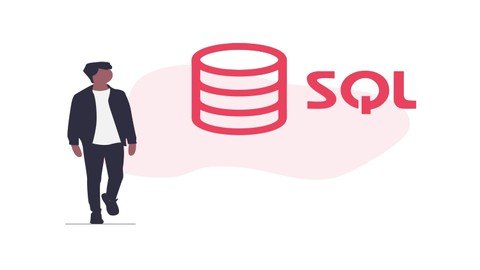
Published 5/2023
MP4 | Video: h264, 1280x720 | Audio: AAC, 44.1 KHz
Language: English | Size: 1.60 GB | Duration: 3h 49m
SQL For Data Analysis
Free Download What you'll learn
SQL Query for Data Analysis
Basic SQL Syntax
SQL Join
Limiting Row
Filtering Data
Set Operation
Subquery
Grouping Data
Common Table Expression
Pivot in SQL
Expression in SQL Server
Function in SQL
Window and Rank Function
Requirements
NO experience needed, Any one can learn this Course
Description
SQL is the most widely used language for data analysis and manipulation. Whether you are a data analyst, data scientist, marketer, engineer, or product manager, knowing SQL will help you access and work with data more efficiently and effectively.In this course, you will learn the basics of SQL and how to use it for various data analysis tasks. You will learn how to write common SQL commands, such as SELECT, FROM, WHERE, JOIN, and GROUP BY. You will also learn how to use more advanced features of SQL, such as subqueries, temp tables, window functions, and date functions.By the end of this course, you will be able to write SQL queries to extract, transform, and analyze data from any relational database. You will also be able to apply your SQL skills to real-world scenarios and projects.This course is designed for beginners an Professional who have some familiarity with data in spreadsheets. No prior programming experience is required. All you need is a computer and an internet connection.Join this course today and start your journey to becoming a SQL expert!?SQL is used in many real-world scenarios where data is stored in relational databases and needs to be accessed, manipulated, or analyzed. Here are some examples:E-commerce websites use SQL to store product information, customer details, orders, payments, and reviews. For example, Amazon uses MySQL, a popular relational database management system, for its online transactions.Social media networks use SQL to store user information, posts, comments, likes, shares, and messages. For example, Facebook uses MySQL for its primary data storage and Hive for its data warehouse.Educational institutions use SQL to store student records, grades, courses, enrollments, and attendance. For example, Stanford University uses Oracle Database, a powerful relational database management system, for its administrative and academic functions.
Overview
Section 1: Introduction
Lecture 1 Introduction
Lecture 2 Connect to SQL Server
Lecture 3 Basic SQL Syntax
Lecture 4 Order of Query Execution
Section 2: Limiting the Rows
Lecture 5 OFFSET and Fetch
Lecture 6 Top with Percentage
Section 3: Filtering Data
Lecture 7 Distinct
Lecture 8 Where Clause with Equal and Not Equal
Lecture 9 Where Clause with ,>=,<= Operator
Lecture 10 Where Clause with not like Operator
Lecture 11 Where Clause with like Operator
Lecture 12 Where Clause with and, Or
Lecture 13 Where Clause with Null
Lecture 14 Where Clause with Exist and Not Exist
Section 4: Joining Table
Lecture 15 Left Join
Lecture 16 Right Join
Lecture 17 Inner Join
Lecture 18 Cross Join
Lecture 19 Full Outer Join
Lecture 20 Advance or Intelligent Join
Section 5: Grouping Data
Lecture 21 Group by
Lecture 22 Group By With Aggregate
Lecture 23 Cube
Lecture 24 Roll UP
Lecture 25 Group By with Where and Having Clause
Lecture 26 Group by with Grouping Set
Section 6: Sub Query
Lecture 27 Sub Query
Lecture 28 Nested Sub Query
Lecture 29 Subquery with Exist and Not Exist
Lecture 30 Sub Query with Any and All
Lecture 31 CO-Related Sub Query
Lecture 32 Sub Query in Expression
Lecture 33 Sub Query in From Clause
Section 7: Set Operator
Lecture 34 Union and Union All
Lecture 35 Intersection
Lecture 36 Except
Section 8: Common Table Expression
Lecture 37 Common Table Expression
Lecture 38 Recursive Common Table Expression
Lecture 39 Multiple CTE in SQL Server
Section 9: Pivot Table
Lecture 40 Pivot Table
Section 10: Expression
Lecture 41 Case Statement
Section 11: Function in SQL
Lecture 42 String Function
Lecture 43 Date and Time Function
Lecture 44 User Defined Function
Lecture 45 Inline Table Value Function
Lecture 46 Multi Statement Table Value Function
Section 12: Window or Analytics Function
Lecture 47 Rank Function
Lecture 48 First and Last
Lecture 49 Lead and Lag
Lecture 50 CUM Distributive Function
Lecture 51 NTILE Function
Working Professionals beginning their Data journey,Data Analyst,Anyone curious to master SQL from beginner to Advanced in short span of time,Students or Professional looking for Job as Data Analyst
Homepage
https://www.udemy.com/course/sql-for-data-analysis-e/
Buy Premium From My Links To Get Resumable Support,Max Speed & Support Me
Links are Interchangeable - Single Extraction
Comments

